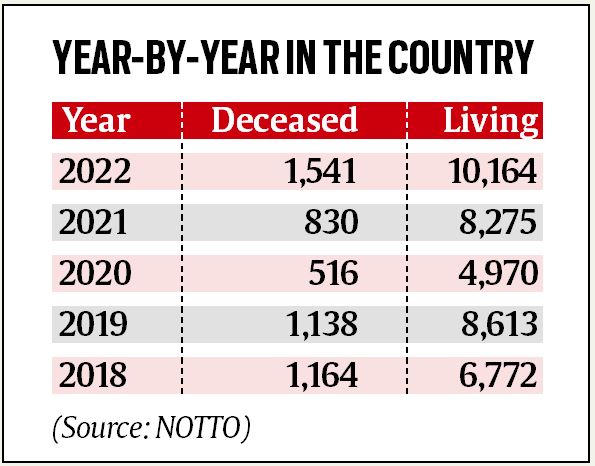Organ donations and transplants in exchange for money are forbidden in India in order to protect poor and vulnerable donors from potential exploitation. Apollo has maintained that the transplants were performed only after receiving go-aheads from the authorisation committee, and a certificate from the Myanmar embassy certifying the donors as relatives.

Allegations of “kidney scams” have surfaced earlier too. Most alleged rackets rely on forged documents to establish a relationship between the donor and recipient.
India’s transplant law
A transplant can be either from a pool of organs of deceased persons donated by their relatives, or from a living person the recipient knows. The Transplantation of Human Organs and Tissues Act, 1994 allows living donations, in most cases, from close relatives such as parents, siblings, children, spouse, grandparents, grandchildren. Altruistic donations from distant relatives, in-laws, or long-time friends are allowed after additional scrutiny to ensure there is no financial exchange.
For living donations from close relatives, involving Indians or foreigners, documents establishing their identities, family tree, documents, and pictures proving the donor-recipient relationship, and documents to show the financial standing of the donor have to be submitted. Donors and recipients are interviewed to establish the relationship.
For donations from unrelated persons, documents and photographic evidence showing their long-term association or friendship have to be submitted along with all other documents. Such cases are examined by an external committee to guard against illegal dealings.

Offering to pay for organs or to supply organs for payment, initiating/ negotiating/ advertising for such an arrangement, looking for a person to supply organs, and abetting in preparing false documents is punishable by jail up to 10 years and a fine of up to Rs 1 crore.
Story continues below this ad
Kidney among most targeted
One, the demand is very high. Every year, an estimated 2 lakh Indians reach end-stage kidney failure. All of them need either a transplant or regular dialysis, but only around 12,000 kidney transplants take place in the country every year.
It is also the transplant with the least risk to the donor.
 Click on the image to register for the Express Explained.Live with Navdeep Singh Puri, Former Indian Ambassador to Egypt and UAE, who will be in conversation with The Indian Express’s Shubhajit Roy.
Click on the image to register for the Express Explained.Live with Navdeep Singh Puri, Former Indian Ambassador to Egypt and UAE, who will be in conversation with The Indian Express’s Shubhajit Roy.
Two, it is the cheapest and most accessible. A kidney transplant costs about Rs 5 lakh, which increases the pool of people who can undergo the procedure. More than 500 centres in India are trained to harvest or transplant kidneys, which provide more opportunities to people who want to undergo the surgery by getting around the law.
Three, the kidney is the organ that can survive the longest outside the body — 24-36 hours. In comparison, lungs remain viable only for 4-6 hours, and the liver for 8-12 hours.
Story continues below this ad
Addressing supply gap
The pool of organs in India can be significantly increased by promoting deceased donations. Organs of only a small fraction of brain deaths are donated, even though they are the ideal candidates for organ donation.
To improve this percentage, the government has rolled out an Aadhaar-linked registry of donors so that their family members can be assured that it was their wish to donate if they die. Only 16% of the total transplants in the country use deceased organs. This, experts say, can be increased several-fold by increasing awareness.
There is also a need to reduce the number of people who require organ transplants.




 Click on the image to register for the Express Explained.Live with Navdeep Singh Puri, Former Indian Ambassador to Egypt and UAE, who will be in conversation with The Indian Express’s Shubhajit Roy.
Click on the image to register for the Express Explained.Live with Navdeep Singh Puri, Former Indian Ambassador to Egypt and UAE, who will be in conversation with The Indian Express’s Shubhajit Roy.




































